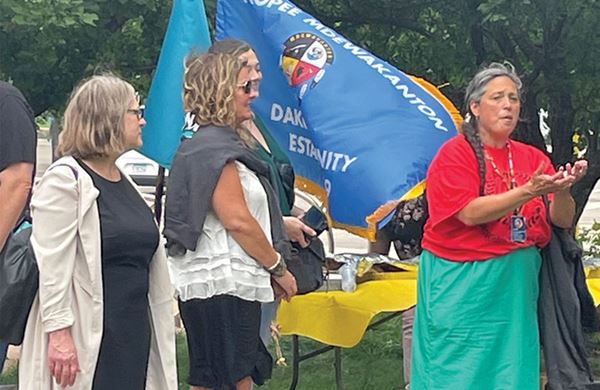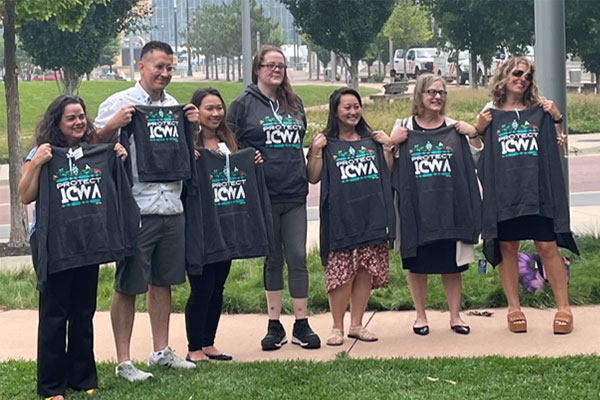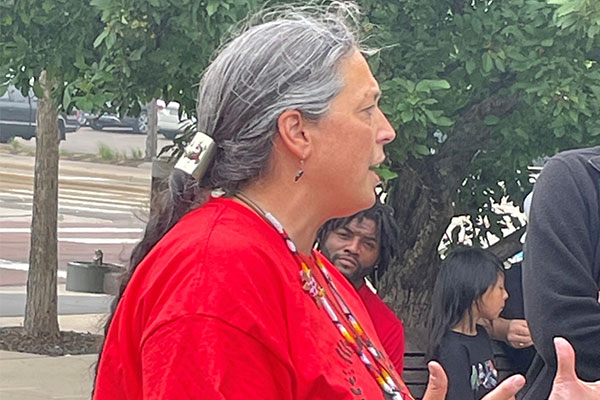Protecting the rights of American Indian families isn’t just a job, it’s a mission

ARS principal attorney Jessica Ryan, with colleagues by her side, speaks at a community event celebrating a U.S. Supreme Court decision upholding the Indian Child Welfare Act (ICWA).
November, celebrated as Native American Heritage Month, marked the close of an important year for protecting the rights of American Indian families in Minnesota. And for principal attorney Jessica Ryan, it is meaningful both professionally and personally.
Ryan, who is a member of the Brothertown Indian Nation, has devoted her career to fighting for legal protections for tribes and native families. Now, she oversees Indian Child Welfare Act (ICWA) child protection cases in Adult Representation Services (ARS), where she has focused on stopping legal threats to the rights of those she calls clients and community.
Preserving families
ARS provides free legal representation to some parents in child protection cases in Hennepin County. Protections unique to American Indian families, outlined in the federal ICWA, are invoked when those cases involve native children, which they often do. In Minnesota, American Indian children are 16 times more likely than white children to be in out of home placement, according to the Minnesota Department of Human Services. ARS approaches these cases with the utmost care and sensitivity. “The way the law looks at a native family is not just a nuclear family,” Ryan said. “Instead, we look at the values of the family structures, the way the nuclear family is interwoven with extended family, and the way that is interwoven with the broader tribe.”
This approach was threatened last year by a U.S. Supreme Court case challenging the constitutionality of ICWA, a 1978 law aimed at keeping native children with native families. But in June, the Supreme Court upheld the law and rejected the challenge raised in the Haaland v. Brakeen case, solidifying legal protections for native children, families and tribes.
“Every one of our ICWA cases is impacted by that decision,” Ryan said. ARS represented a client whose ICWA case was pending before the federal court, waiting for a decision in the Brakeen case. Shortly after its issuance of the Brakeen decision, the Supreme Court issued a favorable decision in the ARS case, affirming the determination sought by the client.
Strengthening state law
While the federal law was being litigated, Ryan and others in Minnesota didn’t hold their breath. They set out to strengthen the Minnesota Indian Family Preservation Act (MIFPA) – already a model for other states – to ensure native tribes, families and children here would maintain the rights and protections afforded under the federal and state law.
Minnesota’s law, originally enacted in 1985, was successfully amended this year to explicitly include the protections outlined in ICWA, so it could stand on its own. “We did a ton of collaborating among the 11 tribes located here, along with our other justice partners,” said Ryan, who has contributed to previous updates of MIFPA. “We have a good way to go, but I’m proud of the work we’ve done.”
Native families have suffered generations of impact from past practices of forced removal of children from their tribes. These state and federal laws are part of ongoing work to acknowledge the harm caused by those separations, to prevent further splintering, and to encourage more culturally relevant ways of approaching native families, but the work is done by people like Ryan in spaces like ARS.
“The American Indian community is one of the most disproportionate populations in every point in the system: Reporting for child protection, child protection screenings … removal proceedings, permanency,” Ryan said. “It’s critical that we know how to work with Indian families, help them stay together, and understand the history they come with.”

ARS employees don shirts with the phrase “Protect ICWA” at an event to raise awareness about threats to the federal Indian Child Welfare Act (ICWA).
Collaborating with tribes
The combination of Ryan’s lived experience and legal expertise leads to better advocacy for clients. “The families we serve [at ARS] do not have to explain themselves; they are working with people who already get it and who understand the importance of that tribal connection,” she said.
To that end, ARS works closely and contracts with The ICWA Law Center, a Minneapolis-based nonprofit that provides legal services and advocacy to Indian families in ICWA cases. The ICWA Law Center is an important partner in serving Hennepin County parents because of their experiential and legal knowledge specific to the native community.
The same is true of other nonprofit partners ARS brings in to support families. “The county does a good job, through the social services department, of reaching out to those Indian agencies,” Ryan said.
The laws governing native child protection cases require collaboration with tribes and efforts to include them in the process, which the county also works proactively to ensure. This is an area where parties, even if seated on opposing sides in a courtroom, work together to find supportive services and culturally appropriate ways to keep a family intact.
Sharing knowledge
Ryan also has been on the front lines of crafting legislation, creating culturally specific training for guardians ad litem, and creating the nation’s first ICWA court here in Minnesota.
Her depth of knowledge and personal connection to the work is an incredible benefit to the clients represented by ARS, but also to her colleagues.
To expand understanding among non-native colleagues and those who don’t work on child protection cases, Ryan has been instrumental in bringing trainings and educational opportunities to ARS. She also serves on the state’s Children’s Justice Initiative team, presenting on ICWA and MIFPA throughout the state.
“All of our stakeholders, all employees, not just attorneys receive training,” she said. “We take a broad approach that everybody can attend these trainings, because there’s so much power in that knowledge.”
A critical piece of the teachings is the unique political status of tribes in the United States. Indians have a distinct and specific sovereign political status and, because of this unique political status, are the only domestic legal entity that entered into treaties with the United States government.
The trainings are also intentional about helping people understand the history, because “if you don’t understand the context of why the Indian Child Welfare Act is important, then you cannot apply the law correctly,” Ryan said.
“If we do more and do better up front, it helps that nuclear family remain together in a good way – with tools and resources they need, including natural extended family supports," Ryan said. “And this has a positive, powerful impact on the community that each of us lives in.”

ARS principal attorney Jessica Ryan speaks at a community event celebrating a U.S. Supreme Court decision upholding the Indian Child Welfare Act (ICWA).
Resources and information
- The ICWA Law Center
- MN Department of Human Services: Indian child welfare policies and procedures
- Minnesota Indian Women’s Resource Center
- Division of Indian Work
- Minneapolis American Indian Center